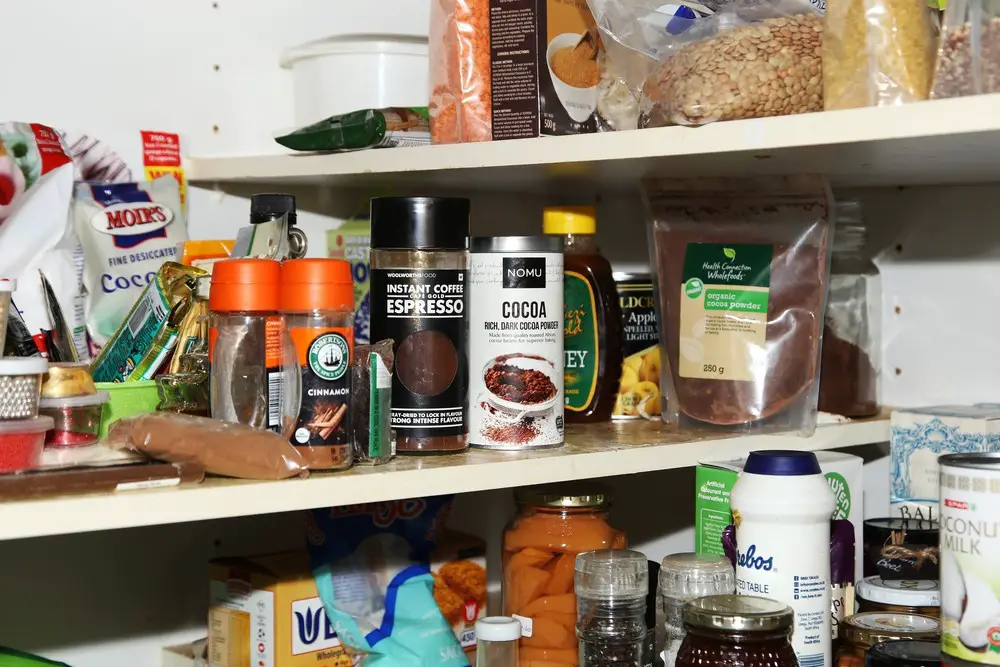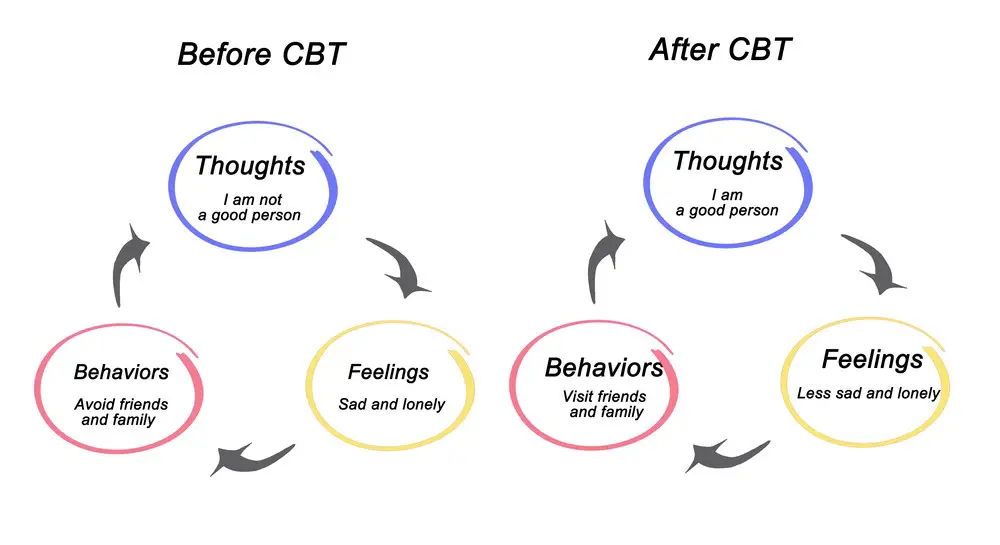As a BetterHelp affiliate, we receive compensation from BetterHelp if you purchase products or services through the links provided
Food hoarding is when individuals compulsively collect, store, and often consume excessive food. This phenomenon can impact physical and mental health, relationships, and overall quality of life. While many people might think of food hoarding simply as being overly prepared, others may not realize that it could be a sign of deeper emotional and psychological issues.
Understanding why and how food hoarding occurs can be instrumental in supporting those who exhibit this behavior. From possible underlying causes to the different types of food hoarding, comprehending the complex nature of food hoarding allows for the development of effective treatment strategies and support systems for both the individual and their loved ones.
Key Takeaways
- Food hoarding is a complex behavior with potential emotional and psychological roots.
- Various types of food can be hoarded, each with its risks and impacts on health
- Effective treatment and support strategies are crucial for those affected and their loved ones
 Understanding Food Hoarding
Understanding Food Hoarding
Food hoarding is a behavior where you stockpile large quantities of food, often beyond what is necessary for normal consumption. The reasons behind food hoarding can vary, but it’s essential to understand its causes and implications.
One common factor that drives people to hoard food is the fear of shortages or uncertainties in supply. This could be due to potential natural disasters, pandemics, or economic instability. When faced with such situations, your instinct might push you to stock up on essentials, ensuring your family’s well-being even during difficult times.
However, food hoarding can have some negative consequences. For instance, it can lead to:
- Waste: Storing excessive amounts of food can result in spoilage and waste, especially for perishable items with a limited shelf life.
- Economic strain: Buying large quantities of food at once can strain your finances, making it challenging to budget for other necessities.
- Limited access for others: When multiple people hoard food, it can create a scarcity for others who might be in more immediate need.
Here are some tips to help you maintain a balance:
- Evaluate your needs: Take stock of your home food and consider its shelf life and consumption rate. This will help you decide how much extra food you need.
- Prioritize non-perishable items: Focus on stocking up on dry goods, canned foods, and other items with long shelf lives. This will help minimize wasting resources and enable you to share with those who might have less.
- Stay informed and plan: Keep yourself updated with current news and events, and plan your shopping trips mindfully.
By understanding food hoarding and its potential drawbacks, you can make more informed choices about your food storage practices. So, balance keeping your family prepared and ensuring all resources are utilized responsibly.
Symptoms of Food Hoarding
Chances are, you have witnessed or even experienced food-hoarding behaviors. These can manifest in various ways, from stockpiling food to refusing to discard expired items. Here, we will explore some of the tell-tale symptoms of food hoarding to give you a better understanding of this behavior.
- Excessive accumulation: A common symptom is the excessive accumulation of food that goes beyond your and your family’s needs. This can include purchasing large quantities of the same item without intending to consume them all or buying perishable items that won’t last long.
- Cluttered living spaces: Sometimes, the amount of food hoarded can take over a person’s living space, making it difficult to navigate or even use certain rooms. It can also result in stacks of unopened food packages, creating an unsanitary environment.
- Emotional attachment to food: A person experiencing food hoarding may be emotionally attached to items in their stockpile. They might experience distress at the thought of throwing away or sharing their food, even with those in need.
- Difficulty discarding expired or spoiled items: Hoarders often have trouble letting go of items past their expiration date or with visible signs of spoiling. This can result in a stockpile filled with expired or unsafe food unfit for consumption.
- Isolation: People exhibiting food-hoarding behaviors may become isolated due to the embarrassment or shame associated with their actions. This can lead to decreased social interactions and negatively impact their mental well-being.
It is worth noting that food hoarding can be a symptom of a broader hoarding disorder, whereby individuals experience difficulty parting with possessions and an intense need to save items despite their value. If you or someone you know struggles with such aspects, accessing professional help is highly recommended.
Key takeaway: Symptoms of food hoarding encompass excessive accumulation, cluttered living spaces, emotional attachment to food, difficulty discarding expired items, and social isolation. Recognizing these symptoms enables you to identify and address hoarding behaviors effectively.

Possible Causes of Food Hoarding
Psychological Factors
Various psychological factors can trigger food hoarding. For some, it may be a way to regain control, especially when facing uncertain or stressful situations. Anxiety and depression can also contribute to food-hoarding behaviors. It’s not uncommon for those with anxiety disorders or a history of trauma to feel safer and more secure when they have a food stockpile.
Some people with mental health conditions like obsessive-compulsive disorder (OCD) may also be prone to food hoarding. In these cases, hoarding food becomes a coping mechanism for managing the overwhelming emotions and fears associated with their mental health issues.
Family and Social Factors
Your upbringing and social environment can also play a role in food-hoarding tendencies. If you grew up in a household where food was scarce or a family member frequently hoarded food, you might have learned that these behaviors were necessary for survival. This learned behavior can be difficult to shake, even as an adult.
Family dynamics and relationships with your parents, children, or caregivers can also impact your tendency to hoard food. For example, if you’ve experienced attachment or trust issues in these relationships, food hoarding might make you feel more self-reliant and less dependent on others.
Social isolation and loneliness can also contribute to food hoarding. When you’re feeling disconnected from your social network, having a well-stocked pantry can provide a semblance of security and stability. In this situation, food doesn’t just serve to satisfy physical hunger – it can also provide emotional comfort.
Understanding the possible causes of food hoarding is crucial in addressing it. Recognizing these psychological and social factors can improve your mental health and develop healthier relationships with food, yourself, and others.
Types of Food Hoarded
Regarding food hoarding, people tend to stockpile various categories of items. Understanding these different types can help you be more mindful of your own food storage habits. Let’s take a look at some of the common categories.
Expired Foods: Often, when people hoard food, they end up with expired items. You may come across cans, boxes, or packages past their “best by” or “use by” dates. While some of these products may still be safe to consume, it’s essential to be cautious and mindful of potential health risks.
Snacks: Snack foods are another popular hoarding category. You might find non-perishable items like chips, cookies, crackers, and candy bars filling up your pantry. These items often have a longer shelf life but can contribute to unhealthy food choices if not managed properly. Try to balance snacks with nutritious options like fruit, nuts, and whole grains to maintain a healthy diet.
In addition to expired foods and snacks, people may hoard other types of food, such as:
- Canned goods: These tend to be popular because of their prolonged shelf life, but it’s important to rotate and prevent an excessive buildup of similar items.
- Dry goods: Things like pasta, rice, and cereal are easily stored and great for meal planning as long as you pay attention to expiration dates.
- Frozen foods: You might stock up on frozen fruits, vegetables, or meats, but remember to utilize storage space efficiently and avoid overstuffing your freezer.
- Emergency supplies: Some people hoard ready-to-eat meals, bottled water, or preserved items to stay prepared for unexpected situations. It’s okay to have emergency supplies on hand, ensure that it’s balanced with your day-to-day consumption.
Key Takeaway: Be aware of the types of food you hoard, and strive to maintain a balance in your pantry. This will help you make healthier choices and prevent wastage due to expiration or overstocking.
Health Risks Associated with Food Hoarding
Food hoarding might seem harmless, but it can pose several health risks to you and your household. Understanding these dangers can help you make better food storage choices and ensure a healthier environment.
Safety and weight concerns: Hoarded food can become unstable, and stacks of food items may collapse, leading to injuries. Expired food items can also increase the risk of foodborne illnesses, contributing to weight changes and digestive issues.
Disease and infestations: Storing food in unsanitary conditions or for longer than necessary can attract pests like rodents and insects. These creatures might bring diseases and contribute to the spread of harmful germs throughout your home.
Fire hazards: Improper storage of food items, especially in large quantities, can increase the risk of fire. This is particularly true for oily or flammable products. Make sure to follow proper storage guidelines and keep your stored food away from heat sources.
Rodent problems: As mentioned earlier, hoarded food is also an invitation for rodents and other pests. These creatures can chew through packaging, contaminate your food supply, and even damage electrical wiring in your home.
To minimize these health risks, try the following strategies:
- Regularly check the expiration dates of your food and dispose of any expired items.
- Keep your food organized and follow the “first-in, first-out” rule to consume older items first.
- Clean your food storage area frequently to maintain a hygienic environment.
- Store food in sealed, pest-proof containers to prevent contamination and infestations.
To be prepared for emergencies or save money on bulk purchases, it’s essential to remain aware of the potential health risks associated with food hoarding. Taking the proper precautions and managing your food supplies responsibly can keep your home safe and germ-free.
 Treatment for Food Hoarding
Treatment for Food Hoarding
Cognitive Behavioral Therapy (CBT)
One of the primary treatments for food hoarding is Cognitive Behavioral Therapy (CBT). As you work with a mental health provider, you’ll learn to identify and change negative thoughts and behaviors contributing to your hoarding tendencies. The process includes:
- Recognizing what triggers your hoarding impulses
- Developing strategies to resist the urge to hoard food
- Practicing decision-making skills to help you let go of unnecessary items
Remember, recovery takes time and commitment, but you can progress significantly with persistence.
Medication
In some cases, medication might be prescribed alongside therapy. Selective Serotonin Reuptake Inhibitors (SSRIs) are commonly used to treat underlying issues such as anxiety and depression, which can be related to food hoarding. Consult your mental health provider to discuss whether medication is appropriate for your treatment plan.
Support Groups
Joining a support group can make a difference in your recovery journey. Sharing your experiences with others facing similar challenges can:
- Provide emotional support and encouragement
- Offer practical tips for overcoming hoarding tendencies
- Help you stay committed to your recovery goals
Connecting with others who understand your struggles can make the process more manageable and even enjoyable.
Key takeaway: To overcome food hoarding, consider engaging in Cognitive Behavioral Therapy (CBT), exploring medication options with your mental health provider, and connecting with support groups for a well-rounded approach to your recovery journey.
Food Hoarding in Different Populations
Children and Adolescents
Food hoarding can be an issue experienced by children and adolescents, especially in certain situations. Factors that contribute to this behavior include:
- Females and males: Both genders can exhibit food-hoarding behavior, but sometimes with different motivations.
- Adoption and foster care: Children frequently moved or experienced instability in their family life may hoard food to self-preservation.
- Attention-deficit/hyperactivity disorder (ADHD): Children with ADHD might hoard food due to impulsivity and difficulty with self-regulation.
To support kids with food-hoarding tendencies, you can:
- Establish routines: Create consistent meal and snack times to help them feel secure.
- Be patient: Understand that overcoming this behavior may take time, and work on building trust.
- Monitor and communicate: Watch food storage spots and talk openly about the issue.
Key takeaway: Addressing the factors contributing to food hoarding behavior and creating a supportive environment will help children and adolescents overcome this issue.
Elderly
Elderly individuals may also engage in food hoarding for various reasons, some of which include:
- Limited mobility: Difficulty in moving around or shopping may lead to stockpiling food to avoid frequent trips to the store.
- Fixed income: Saving money and being frugal can evoke a determination to make food last longer, leading to hoarding.
- Fear of scarcity: Past experiences of food insecurity or living through challenging times can lead to hoarding behaviors.
To help your elderly loved ones, consider the following strategies:
- Offer assistance: Volunteer to aid in grocery shopping or help with meal preparation and planning.
- Encourage socialization: Help them engage in social activities to reduce isolation and the need to hoard food.
- Share resources: Inform them about food banks or community programs that can help alleviate concerns about scarcity.
Key takeaway: Understanding the reasons behind food hoarding in elderly individuals can inform the best course of action for providing assistance and support.

Impact of Food Hoarding
Food hoarding can affect both individuals and communities in various ways. Let’s explore some of the key impacts that might arise from this behavior.
Eating habits: When you hoard food, it’s easy to develop unhealthy eating patterns. You might consume more processed and non-perishable items, leading to poor nutrition and even overeating.
Food insecurity: While hoarding may give you a sense of security, it can contribute to food scarcity in your community. By stockpiling food, especially during times of crisis, you may unintentionally worsen food insecurity for your neighbors who might be struggling to find essential supplies.
Hunger and starvation: As food hoarding can limit the availability of certain products, it can potentially contribute to hunger and starvation in vulnerable populations. This is especially relevant in regions where access to nutrition-sensitive resources is challenging.
Neglect: If your food-hoarding behavior becomes extreme, it could result in neglecting other aspects of your life. Relationships, self-care, and even basic household chores might suffer as you become more preoccupied with acquiring and storing food.
Isolation: Food hoarding can lead to social isolation, as the behavior can be seen as secretive or embarrassing. You might distance yourself from friends and loved ones to avoid conversations about your hoarding habits, further isolating yourself.
Remember, while it’s not unusual to want to be prepared, it’s important to strike a balance. Consider the impact of food hoarding on yourself and those around you as you work towards creating a more mindful and balanced approach to food consumption and storage.
Coping Strategies for Loved Ones
Be understanding and supportive: Show empathy towards their feelings and behaviors. Acknowledge the distress and anxiety your loved one may be experiencing due to food hoarding. The clutter, inability to discard items, and desire to constantly stockpile can make their life difficult. Your understanding can help alleviate some of their turmoil.
Be Respectful and Non-Judgmental: Refrain from making judgments or criticizing their actions. Recognize that food hoarding is often connected to their personality and past experiences. It’s important to approach the situation delicately and with respect.
Communicate openly: Talk honestly about the issue and express your concerns while being sensitive to their feelings. Ensure you’re both on the same page and offer support in finding solutions to the problem. Keep the lines of communication open and focus on discussing the behaviors rather than blaming them.
Encourage professional help: Encourage your loved one to seek assistance from a therapist, counselor, or support group. Professional help can equip them with the tools to manage their food-hoarding tendencies and overcome any underlying issues contributing to their distress.
Help them sort and declutter: Offer to lend a hand in organizing their food supply and help declutter the surrounding areas. Sorting through items and discovering expired food can serve as an eye-opener and may even lead to a change in behavior. However, remember to be patient and work at their pace to keep the process constructive.
Ensure safety for everyone, including pets: Food hoarding can sometimes lead to unsanitary conditions, which poses a risk to the health and well-being of everyone in the home. Together, create a safety plan that addresses the concerns and implement a system to keep everyone’s living environment clean and safe.
Stick to boundaries: Establish clear boundaries and expectations regarding food storage and shopping habits. Emphasize that these rules are in place to maintain a tidy environment and ensure that everyone’s needs are met.
Be patient and persistent: Changing long-standing behaviors can take time, so don’t expect overnight improvements. Stay dedicated, consistent, and supportive in your efforts to help them cope with food hoarding issues. Remember that the journey to recovery might be long, but together, you can help your loved one regain control over their situation.
Key takeaway: Approach the food hoarding issue with empathy, understanding, and patience. Open communication, seeking professional help, and working together on decluttering can make a significant difference in your loved one’s life and help them manage their food-hoarding tendencies.
Food Hoarding and Eating Disorders
Food hoarding is a common behavior seen in individuals with eating disorders. It is often related to fear of scarcity, emotional attachment to food, or as a means of control. We will explore how food hoarding can be connected to different eating disorders such as anorexia, bulimia, and others.
Anorexia Nervosa is characterized by an intense fear of gaining weight and a disturbed body image. People with anorexia may engage in food hoarding to avoid eating. They might hide or store food in their room, stealing it from others or feeding it to pets. This behavior can be linked to their desire to control their food intake and maintain their low body weight.
Bulimia Nervosa involves episodes of binge eating followed by compensatory behaviors such as self-induced vomiting, fasting, or excessive exercise. Food hoarding in bulimia can manifest as hiding food in preparation for binging or to conceal the evidence of a binge. It’s not uncommon for individuals with bulimia to steal food in order to fuel their binge eating episodes.
Other eating disorders such as Binge Eating Disorder and Avoidant/Restrictive Food Intake Disorder, may also display food hoarding behaviors. For example, individuals with Binge Eating Disorder might hoard food as a source of comfort or to satisfy their cravings during binge episodes.
Here are some key takeaways to remember:
- Food hoarding can be a sign of an underlying eating disorder.
- Anorexia Nervosa and Bulimia Nervosa often involve food hoarding as a means of control or concealment.
- Binge Eating Disorder and other eating disorders may also display food-hoarding behavior.
 The Red Flags: When Food Hoarding Becomes a Concern
The Red Flags: When Food Hoarding Becomes a Concern
Recognizing the symptoms of food hoarding is the first step towards helping someone who struggles with this behavior. Here are some red flags that signal it might be time for professional help:
- Emotional Attachment to Food: If letting go of food items causes extreme distress, it’s more than just a preference; it’s an emotional anchor.
- Social Isolation: Do you know someone skipping social events to stay home and sort through their food stash? This could indicate that their food hoarding is becoming a barrier to human connections.
- Impact on Health: Watch out for signs like obesity, malnutrition, or food poisoning. Spoiled or excessive food can lead to a series of health problems.
- Financial Strain: Overbuying food can strain the budget, leading to stress and potentially more hoarding as a coping mechanism.
? Tip: The red flags can vary in intensity and frequency. However, if these signs disrupt daily life, it’s time to consider therapy.

Let’s Talk: Goals of Therapy for Food Hoarding
Addressing food hoarding through therapy aims for holistic improvement. Below are the key goals a therapeutic approach might target:
- Emotional Intelligence: Therapy can help identify what triggers the compulsion to hoard food, providing tools to manage these emotional states better.
- Cognitive Re-framing: Altering the thought processes around food can help lessen the need to hoard. The therapist works on changing the individual’s relationship with food from dependency to sustenance.
- Behavioral Changes: Practical exercises and home assignments may be used to change the habits that lead to hoarding slowly.
- Family Involvement: Educating and involving family members can reinforce therapy practices at home, creating a supportive environment for change.
? Tip: Different therapeutic approaches like Cognitive Behavioral Therapy (CBT) or Dialectical Behavior Therapy (DBT) can be tailored to individual needs.
Signs of Progress: How to Know When Therapy Is Working
Therapeutic success doesn’t happen overnight, but these signs can indicate that you or your loved one is making progress:
- Reduced Anxiety: Less fretting over food, fewer worries about the scarcity of items, or an easier time parting with them are all good signs.
- Improved Relationships: As the hoarding subsides, you may find it easier to invite people, leading to improved social interactions.
- Changes in Shopping Behavior: Instead of hoarding, you might notice more thoughtful, planned grocery trips that align with actual needs.
- Emotional Stability: Gaining control over the emotional triggers associated with food hoarding is a massive step forward.
? Tip: Progress is not always linear. There may be setbacks, but what matters is the overall trajectory toward healthier behaviors and emotional states.
Frequently Asked Questions

What causes someone to hoard food?
Various factors, such as past experiences with scarcity or trauma, anxiety, depression, or financial instability, can cause food hoarding. Sometimes it is deeply rooted in an individual’s childhood and upbringing. It’s important to empathize with the person and understand that hoarding often stems from a place of fear or insecurity.
How can food hoarding be treated?
There are several strategies to treat food hoarding:
- Encourage the individual to seek professional help from a therapist or psychologist specializing in hoarding behaviors.
- Consider organizing the pantry or food storage areas to make it more manageable.
- Create a meal plan to help use the stored food more efficiently.
- Establish a support system for the individual, including family members and friends.
Remember, improvement may take time. Patience and understanding are vital.
What are the risks associated with food hoarding?
Food hoarding can lead to various risks, such as:
- Spoilage and waste due to an excess of perishable items.
- Pest infestations caused by improperly stored food items.
- Fire hazards due to cluttered spaces.
- Strained relationships with family members or neighbors.
By addressing these concerns early on, you can help mitigate these risks.
How does food hoarding differ from regular stockpiling?
Regular stockpiling is typically a well-thought-out and organized process, where individuals consciously store enough food to last them a specific period. It is often based on rational reasons, such as emergencies or natural disaster preparation. On the other hand, food hoarding is an irrational and compulsive behavior where the hoarder accumulates excess food without a reasonable purpose. The difference lies in the intention, organization, and the impact it has on the individual’s life.
How can I help a loved one who hoards food?
Here are some tips to help a loved one who hoards food:
- Open a dialogue and express your concerns in a non-judgmental manner.
- Offer to help them declutter and organize their food storage.
- Encourage them to seek professional intervention if necessary.
- Provide emotional support and patience throughout the process.
Remember, it may be a sensitive topic for them, so approach it with empathy and understanding.
Is food hoarding related to specific psychological disorders?
Food hoarding can be associated with several psychological disorders, such as obsessive-compulsive disorder (OCD), anxiety, and depression. It can also be a symptom of hoarding disorder, a recognized mental health issue. A professional mental health evaluation can help determine if an underlying condition needs to be addressed.
About Jacob Maslow
After surviving the traumatizing events of 9/11, I took it upon myself to heal through helping others. I’m the primary caregiver of my children and understand from first-hand experience the lonely paths you have to walk as a partner and parent when leaving an unhealthy relationship.
We’re all echoing in a dark space that doesn’t have to be this empty, and that’s been my mission since finding solace and recovery in therapy: To help comfort others who are still in shock and at the prime of their struggle.
I came across BetterHelp after searching for this type of community. I wanted to belong to a body of proactive therapists and supportive therapy veterans that allowed me to see other sides of the story.
It was unconventional, and that’s what attracted me most. During my most challenging times, when my ex-wife completely cut me off from my children, I found comfort and clarity through BetterHelp.
Instead of being chained to a strict therapist recommendation, I was in charge of who I felt understood my struggle most. That allowed me to find my true peace, as I was reunited with those who read behind my words and had first-hand experience with my trauma.
Recovery is a choice; with BetterHelp, that choice will be a few clicks away. You can join their couples-oriented platform, Regain.us for those stuck with family estrangement and toxic relationship patterns.
- How Having Cybersecurity Protection Helps You Relax - April 25, 2025
- 8 Reasons Why Spending Time Outside Calms You Down - April 25, 2025
- 5 Helpful Ideas for Managing Stress During a Plumbing Emergency - April 24, 2025
This site contains affiliate links to products. We will receive a commission for purchases made through these links.


 Understanding Food Hoarding
Understanding Food Hoarding Treatment for Food Hoarding
Treatment for Food Hoarding
 The Red Flags: When Food Hoarding Becomes a Concern
The Red Flags: When Food Hoarding Becomes a Concern
